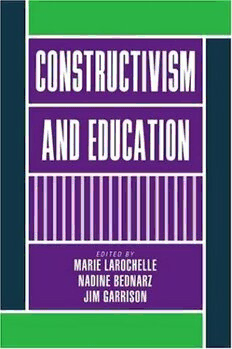
Constructivism and education PDF
318 Pages·1998·3.271 MB·English
Most books are stored in the elastic cloud where traffic is expensive. For this reason, we have a limit on daily download.
Preview Constructivism and education
Description:
This international and interdisciplinary collection of chapters presents and discusses the many issues and educational practices that are touched on by constructivism. Drawing on perspectives from a range of different fields (ethics, mathematics education, philosophy, social psychology, science education, social studies), this book invites us to reposition ourselves in relation to the major currents that have influenced education in this century, namely pragmatism, genetic epistemology, and social interactionism. The essays call for new reflection on the questions that are central to the project of education and that, in particular, involve the validity of knowledge and types of knowledge, the compartmentalization of school subjects, the mediating role of teachers, and, above all, the ends of education. In so doing, this book relaunches the discussion on constructivism's potential for the social empowerment of groups and individuals.
See more
The list of books you might like
Most books are stored in the elastic cloud where traffic is expensive. For this reason, we have a limit on daily download.
